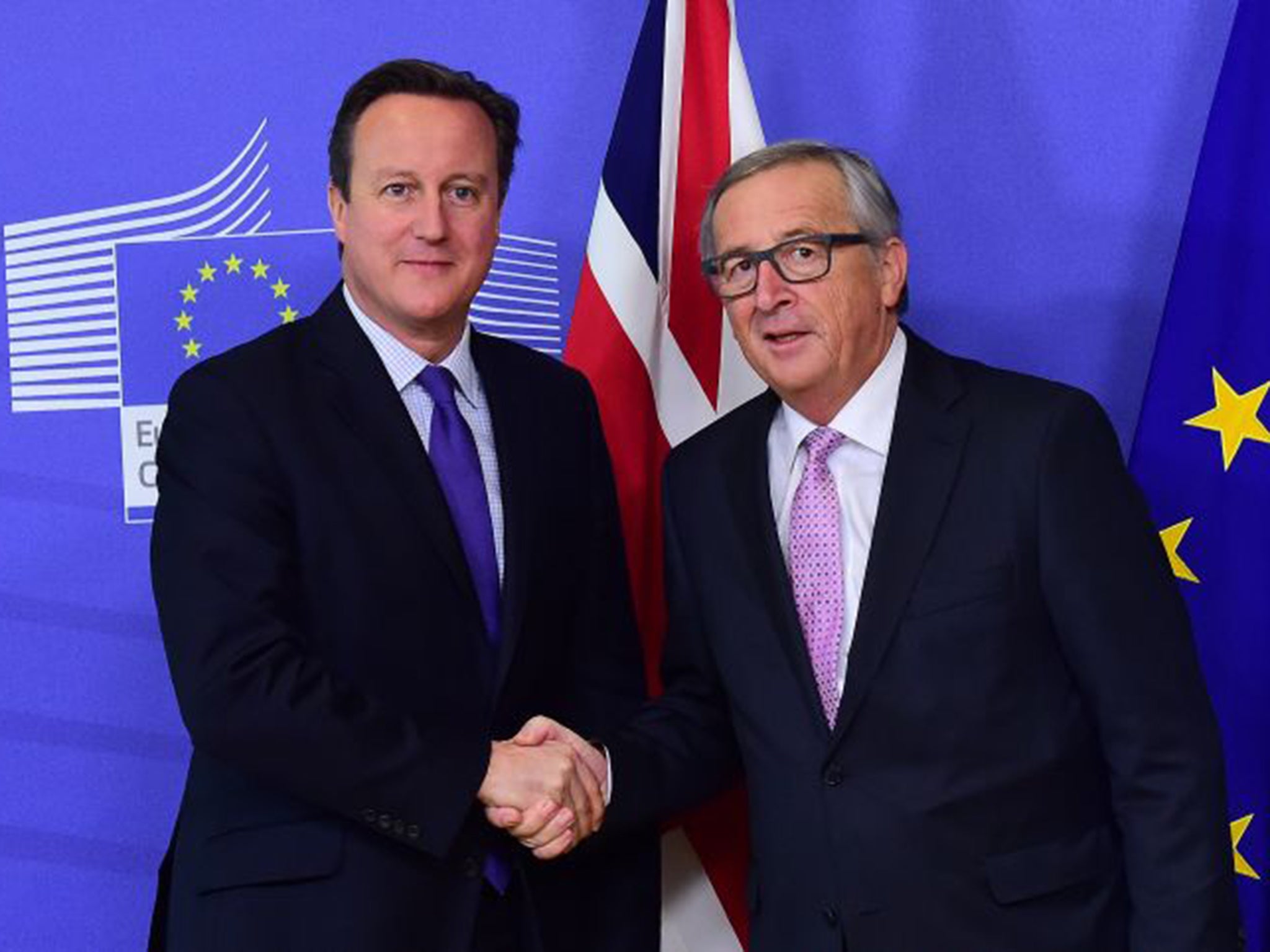EU referendum: David Cameron backs down on migrant benefit ban demands
Prime Minister will tell EU leaders he is willing to lift the restriction to make a deal over Britain’s membership

David Cameron is prepared to abandon his demand for a four-year ban on European migrants receiving tax credits in order to strike a deal on Britain’s renegotiated membership of the EU, government sources have revealed.
In the face of “serious and passionate” opposition to the proposed benefit restriction, the Prime Minister will make it clear to EU leaders at a crunch summit on Thursday that he is prepared to give way and accept alternative proposals – as long as they reduce the flow of migration to Britain.
A senior source said Mr Cameron would not take the four-year benefit restriction off the table “until something better is put on”, but admitted that it was no longer a red line.
Mr Cameron’s dramatic climbdown sets the scene for a surprise agreement limiting the inflow of migrants instead, and comes amid growing speculation that a proposed “emergency brake”, allowing the Government to temporarily restrict freedom of movement, may be agreed.
Government sources said the Prime Minister will order diplomats to work on a new deal in time for the next Brussels summit in February, when the final agreement is expected to be sealed, if he believes the other European leaders have the “political will” to find a compromise.

Mr Cameron’s retreat, which will be jumped on by the campaign for Britain to leave the EU, would allow for a short spring campaign and a referendum in July.
The Prime Minister made the removal of in-work benefits the centrepiece of his renegotiation with Brussels, alongside proposals to protect non-eurozone countries, improve “competitiveness” and protect countries outside the EU.
However, European leaders from southern and eastern Europe refused to sign up to the proposal – insisting that it amounted to unacceptable “discrimination”, because it would mean British workers being paid more than migrants for the same job.
Senior diplomats are now working on an “International Legal Agreement”, signed by EU leaders, which would circumvent the European Parliament and Commission. Officials say such an inter-governmental agreement is a last resort but could be lodged without difficulty with the UN and attached to any future EU treaty, to reassure Eurosceptics that the deal was “legally binding and irreversible”.
But Mr Cameron has been privately warned by senior European officials that such a “messy package” of reforms would not be finally ratified in a new EU treaty until “around 2020” – when he is no longer prime minister.

Senior negotiators have also been clear with the PM that EU treaties can only be “supplemented” and not changed. The final deal is expected to be a “package of legal agreements and opt outs” – some of which will be able to be implemented immediately, while others will take years.
Documents seen by The Independent on Sunday reveal that British officials are also working on a “new label” for the UK’s membership, designed to signify its special deal. However, the new arrangement will not be called “associate status”, as has been suggested previously.
This would give a “better articulation of a very specific relationship with the EU”, according to a confidential briefing note based on conversations with senior diplomats at the centre of the negotiations.
Mr Cameron has become increasingly frustrated with the so-called “Sherpas” – senior EU negotiators leading the talks – dismissing them in private as “lawyers and theologians”, The IoS can reveal.
He believes this week’s summit with all 27 other EU leaders is a “big step” towards striking a deal.
A government source confirmed that the Prime Minister will “seek to move a step closer to a deal” this week by addressing Britain’s concern over immigration levels directly with other EU leaders. The source said there would be “substantive political discussion” of the reforms that the Prime Minister has proposed, with the UK renegotiation given “top billing”. The source said the PM would “talk leaders through the concerns of the British people” before opening up the discussion to “focus on the most difficult area – a package of changes to welfare rules”.
The source added: “Levels of migration from the EU to the UK are a major concern for the British people.” But the source went on: “What matters most is to fix the problems, not the precise form of the arrangements. On welfare, he will aim to unlock the political will necessary to find a solution, effectively giving the green light to officials to work up a solution that would both deliver on the Prime Minister’s objective of better controlling migration from the EU while also being acceptable to all.”
At the summit Mr Cameron will also call for an EU-wide ban on high-powered semi-automatic weapons – such as those used by the Islamic State terrorists in last month’s Paris terror attacks.

Diplomats had floated the idea of taking tax credits away from British workers for four years after they turn 18. This would allow the Government to withdraw tax credits from migrants for four years, because the restriction would apply equally to British workers and Europeans.
However, Tory MPs have warned that any deal which makes British workers worse off would be “totally unacceptable”. Another option under consideration is for British workers abroad to lose access to local benefits for four years.
However, Robert Oxley, a spokesman for the Vote Leave campaign, dismissed the chances of any deal being agreed which would allow the UK to control migration: “Whether it is tinkering with the benefits system or relying on Brussels for an emergency brake, the renegotiation isn’t going to hand powers back to the UK. The renegotiation is offering only trivial changes, so only by voting leave can we take back control.”
According to a ComRes poll for The IoS, the public overwhelmingly backs the Prime Minister’s original proposal to limit migrants’ access to tax credits – but had little confidence that he will deliver it.
Overall, just under three-quarters of Brits, 74 per cent, agree that people from the EU who come to live in the UK should only get tax credits after four years. But just a third – 31 per cent – think Mr Cameron will be able to renegotiate Britain’s relationship with the EU so this can happen.
The IoS also understands that up to five Cabinet ministers are considering joining the campaign to leave the European Union.
A senior Tory MP also revealed that around half of Conservative MPs would vote to leave the EU under the current terms.
Join our commenting forum
Join thought-provoking conversations, follow other Independent readers and see their replies
Comments
Bookmark popover
Removed from bookmarks